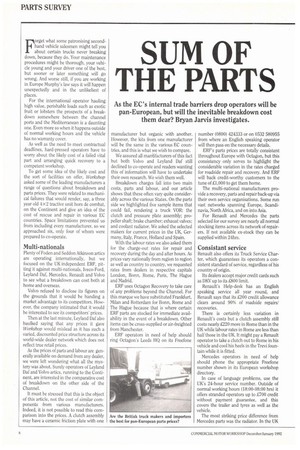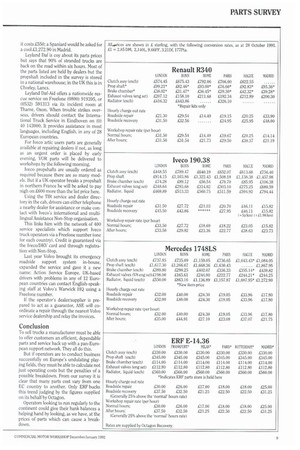SUM OF THE PARTS
Page 76

Page 77

If you've noticed an error in this article please click here to report it so we can fix it.
Forget what some patronising secondhand vehicle salesmen might tell you about certain trucks never breaking down, because they do. Your maintenance procedures might be thorough, your vehicle young and your driver one of the best, but sooner or later something will go wrong. And worse still, if you are working in Europe Murphy's law says it will happen unexpectedly and in the unlikeliest of places.
For the international operator hauling high value, perishable loads such as exotic fruit or lobsters the prospects of a breakdown somewhere between the channel ports and the Mediterranean is a daunting one. Even more so when it happens outside of normal working hours and the vehicle has no warranty cover.
As well as the need to meet contractual deadlines, hard-pressed operators have to worry about the likely cost of a failed vital part and arranging quick recovery to a competent workshop.
To get some idea of the likely cost and the sort of facilities on offer, Workshop asked some of the leading manufacturers a range of questions about breakdown and parts prices. They were related to mechanical failures that would render, say, a three year old 4x2 tractive unit hors de combat. on the Continent and give an idea of the cost of rescue and repair in various EC countries. Space limitations prevented us from including every manufacturer, so we approached six, only four of whom were prepared to co-operate.
Multi-nationals
Plenty of Foden and Seddon Atkinson artics are operating internationally, but we focused on the UK independent ERF, pitting it against multi-nationals, Iveco-Ford, Leyland Daf, Mercedes, Renault and Volvo to see what a breakdown can cost both at home and overseas.
Volvo refused to disclose its figures on the grounds that it would be handing a market advantage to its competitors. However, the company intimated that it would be interested to see its competitors' prices.
Then at the last minute, Leyland Daf also baulked saying that any prices it gave Workshop would mislead as it has such a varied, discounted price structure across its world-wide dealer network which does not reflect true retail prices.
As the prices of parts and labour are generally available on demand from any dealer, we were left wondering what all the mystery was about. Surely operators of Leyland Daf and Volvo artics, running to the Continent, are interested in the comparative cost of breakdown on the other side of the Channel.
It must be stressed that this is the object of this article, not the cost of similar components from various manufacturers. Indeed, it is not possible to read this comparison into the prices. A clutch assembly may have a ceramic friction plate with one
manufacturer but organic with another. However, the kits from one manufacturer will be the same in the various EC countries, and this is what we wish to compare.
We assured all mantfacturers of this fact but both Volvo and Leyland Daf still declined to co-operate and readers wanting this of information will have to undertake their own research. We wish them well.
Breakdown charges fall into two main costs, parts and labour, and our article shows that these often vary quite considerably across the various States. On the parts side we highlighted five sample items that could fail, rendering a truck VOR: the clutch and pressure plate assembly; propeller shaft; brake chamber; exhaust valves; and coolant radiator. We asked the selected makers for current prices in the UK, Germany, Italy, France, Holland and Spain.
With the labour rates we also asked them for the charge-out rates for repair and recovery during the day and after hours. As prices vary nationally from region to region as well as country to country, we requested rates from dealers in respective capitals London, Bonn, Rome, Paris, The Hague and Madrid.
ERF uses Octagon Recovery to take care of any problems beyond the Channel. For this marque we have substituted Frankfurt, Milan and Rotterdam for Bonn, Rome and The Hague because that is where certain ERF parts are stocked for immediate availability in the event of a breakdown. Other items can be cross-supplied or air-freighted from Manchester.
ERF operators in need of help should ring Octagon's Leeds HQ on its Freefone number (0800) 424333 or on 0532 580955 from where an English speaking operator will then pass on the necessary details.
ERF's parts prices are totally consistent throughout Europe with Octagon, but this consistency only serves to highlight the considerable variation in the rates charged for roadside repair and recovery. And ERF will back credit-worthy customers to the tune of £1,000 to get them home.
The multi-national manufacturers provide a recovery, parts and repair back-up via their own service organisations. Some run vast networks spanning Europe, Scandinavia, North Africa, and on into Asia.
For Renault and Mercedes the parts selected for our survey are nearly all normal stocking items across its network of repairers. If not available ex-stock they can be supplied within 24hrs.
Consistant service
Renault also offers its Truck Service Charter, which guarantees its operators a consistent standard of service, regardless of his country of origin.
Its dealers accept major credit cards such as DKV up to its £800 limit.
Renault's Help-desk has an English speaking service all year round, and Renault says that its £200 credit allowance clears around 90% of roadside repairs/ recoveries.
There is certainly less variation in Renault's costs but a clutch assembly still costs nearly £220 more in Rome than in the UK while labour rates in Rome are less than half those in the UK. It might pay a Renault operator to take a clutch out to Rome in his vehicle and cool his heels in the Trevi fountain while it is fitted.
Mercedes operators in need of help should phone the appropriate Freefone number shown in its European workshop directory.
In case of language problems, use the UK's 24-hour service number. Outside of normal working hours (18:00-08:00 his) it offers stranded operators up to £700 credit without payment guarantee, and this covers the trailer and tyres as well as the vehicle.
The most striking price difference from Mercedes parts was the radiator. In the UK it costs .£550; a Spaniard would he asked for a cool .£1,272.90 in Madrid.
Leyland Daf is coy about its parts prices but says that 90% of stranded trucks are back on the road within six hours. Most of the parts listed are held by dealers but the propshaft included in the survey is stored in a national warehouse; in the UK this is in Chorley, Lancs.
Leyland Daf-Aid offers a nationwide rescue service on Freefone (0800) 919395, or (0532) 591313 via its incident room at Thame, Oxon. When trouble strikes overseas, drivers should contact the International Truck Service in Eindhoven on (0) 40 143000. It provides assistance in most languages, including English, in any of 28 European countries.
For Iveco artic users parts are generally available at repairing dealers if not, as long as an urgent order is placed by early evening, VOR parts will be delivered to workshops by the following morning.
Iveco propshafts are usually ordered as required because there are so many models, But if a UK operator breaks a propshaft in northern France he will be asked to pay nigh on .€600 more than the list price here.
Using the TIR service and dealer directory in the cab, drivers can either telephone a nearby dealer for assistance or make contact with Iveco's international and multilingual Assistance Non-Stop organisation_ This links him with the network of 400 service specialists which support Iveco truck operators via a Freefone number (one for each country). Credit is guaranteed via the lveco/DKV card and through registration with Non-Stop.
Last year Volvo brought its emergency roadside support system in-house, expanded the service and gave it a new name: Action Service Europe. UK-based drivers with problems in any of 12 European countries can contact English-speaking staff at Volvo's Warwick HQ using a Freefone number.
If the operator's dealer/supplier is prepared to act as a guarantor, ASE will coordinate a repair through the nearest Volvo service dealership and relay the invoices.
Conclusion
To sell trucks a manufacturer must be able to offer customers an efficient, dependable parts and service back up with a pan-European support network. They all do this.
But if operators are to conduct business successfully on Europe's undulating playing fields, they must be able to calculate not just operating costs but the penalties of a possible breakdown. From our survey it is clear that many parts cost vary from one EC country to another. Only ERF bucks this trend judging by the figures supplied on its behalf by Octagon.
Operators looking to run regularly to the continent could give their bank balances a helping hand by looking, as we have, at the prices of parts which can cause a breakdown.




























































































